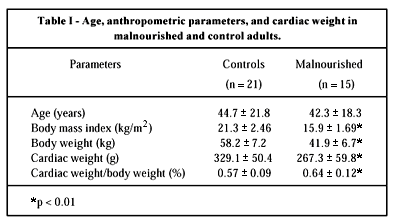OBJECTIVE: To compare the heart weight and the heart weight/body weight coefficient of adults with and without chronic malnutrition. METHODS: In an initial case series of 210 autopsies performed in adults, we recorded body and heart weights and calculated the heart weight/body weight coefficients (HW/BW x 100). The exclusion criteria were as follows: positive serology for Chagas' disease, edema, obesity, heart diseases, hepatopathies, nephropathies, and systemic arterial hypertension. Malnutrition was characterized as a body mass index <18.5kg/m². Differences with p<0.05 were considered significant. RESULTS: Individuals in the malnourished (n=15) and control (n=21) groups were statistically different, respectively, in regard to body mass index (15.9±1.7 versus 21.3±2.5kg/m²), heart weight (267.3±59.8 versus 329.1±50.4g), and the HW/BW coefficient (0.64±0.12 versus 0.57±0.09%). A positive and significant correlation was observed between heart weight and body mass index (r=0.52), and between heart weight and body weight (r=0.65). CONCLUSION: Malnourished individuals have lighter hearts and a greater HW/BW coefficient than non-malnourished individuals do. These findings indicate a possible preservation of the myocardium in relation to the intensity of weight loss associated with the probable relative increase in cardiac connective tissue and heart blood vessels.
heart; cardiac hypotrophy; nutrition; protein-calorie malnutrition



